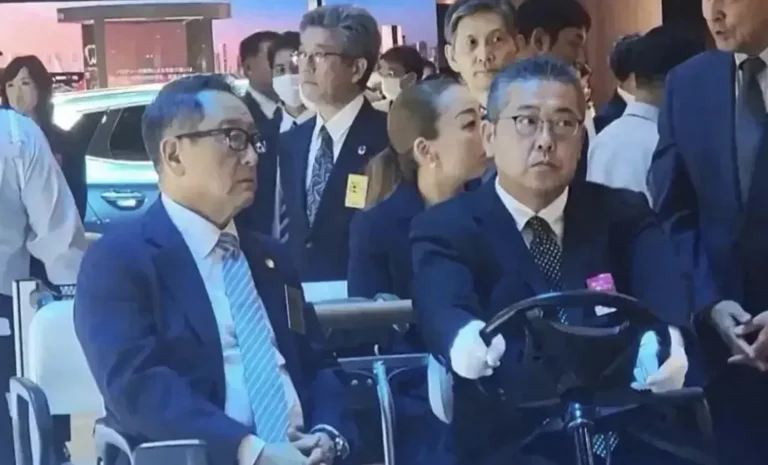
In a recent report from October 30th, Japanese media TBS revealed that Akio Toyoda, Chairman of Toyota, shared his views on the future of Japanese automakers during an exclusive interview at the Tokyo Motor Show. This article delves into the insights and perspectives presented by Akio Toyoda, highlighting the challenges and opportunities facing the Japanese automotive industry.
1. Winning Against Chinese Cars
Akio Toyoda emphasized the need for Japanese automakers to ‘win’ against Chinese car manufacturers. While sales are important, he stated that winning goes beyond sales figures. Japanese manufacturers play a significant role in the global landscape by providing mobility, carrying information, and delivering happiness through their cars.
2. The Role of Japanese Manufacturers
Toyoda underlined the multifaceted role of Japanese manufacturers. Cars are not just a mode of transportation but a means of mobility, information exchange, and enhancing the quality of life. To succeed, Japanese companies need to understand and harness the broader impact of their products.
3. The Need for New Strategies
The Chairman highlighted the necessity for Japanese manufacturers to formulate new strategies for survival. With a changing automotive landscape, adaptation and innovation are critical for staying competitive.
4. Toyota’s Transition to New Energy Sources
4.1. Lack of a Clear Goal
One notable challenge facing Toyota is the absence of a unified goal for transitioning to new energy sources. While the company has excelled in hybrid technology, the path to electric vehicles remains unclear.
4.2. Akio Toyoda’s Resistance to Electric Cars
Akio Toyoda has been a vocal critic of electric cars, asserting that the recent slowdown in Toyota’s sales vindicates his stance. He argued that the auto industry should continue investing in hybrid cars, emphasizing that electric vehicles are not the sole solution for achieving carbon neutrality.
5. Akio Toyoda’s Stance on Toyota’s Development
5.1. A Diverse Range of Car Products
Drawing a metaphor, Toyoda compared Toyota to a department store, highlighting its capacity to cater to diverse customer needs through a wide range of car products. He insisted that Toyota does not want to abandon any segment of the market.
5.2. Promoting Different Energy Sources
Toyoda advocated for greater diversity in energy sources, emphasizing the potential of hydrogen and biofuels alongside traditional gasoline and hybrid systems to achieve sustainability.
6. Contrasting Views within Toyota Leadership
6.1. Tetsuo Saito’s Perspective
In contrast to Akio Toyoda’s stance, Toyota’s current CEO, Tetsuo Saito, expressed support for electric cars. Saito highlighted that electric vehicles offer environmental benefits, driving enjoyment, and a variety of experiences. This discrepancy in leadership views adds complexity to Toyota’s future strategy.
7. Toyota’s Electric Car Showcase at the 2023 Tokyo Motor Show
7.1. New Electric Concept Cars
At the Tokyo Motor Show, Toyota unveiled several electric concept cars, including the Land Cruiser Se, FT-3e, and FT-Se, marking the company’s foray into electric vehicles.
7.2. Lexus’s Transition to Pure Electric Brand
Luxury brand Lexus also showcased electric concept cars, signaling its intent to transition into a pure electric brand by 2035.
8. Conclusion
Akio Toyoda’s vision for Japanese automakers encapsulates the need for adaptation, innovation, and a clear strategy in an evolving automotive landscape. The contrasting views within Toyota’s leadership highlight the complexities of navigating the transition to new energy sources.
9. Unique FAQs
A1: Japanese automakers face several challenges in the current market, including increased competition from Chinese car manufacturers, evolving consumer preferences, and the global shift toward electric and sustainable transportation. These challenges necessitate the development of new strategies and innovations to remain competitive.
A2: Akio Toyoda believes that Japanese manufacturers play a significant role in the global landscape by providing more than just cars. He emphasizes that cars are not merely means of transportation but also serve as a means of mobility, information exchange, and delivering happiness. To him, the role of Japanese manufacturers extends beyond sales and involves enhancing the quality of life and well-being.
A3: Honda’s President, Minoru Kato, emphasizes the need for rapid expansion in all business areas. He believes that stagnation in the industry is not an option for survival. This suggests that Honda is focused on growth and adaptability to meet the evolving demands of the automotive market.
A4: Akio Toyoda has been vocal about his resistance to the shift to electric cars. He argues that the recent slowdown in Toyota’s sales vindicates his stance. He believes that electric vehicles are not the sole solution for achieving carbon neutrality and that automakers should continue investing in hybrid cars. In his view, electric cars are overhyped, and a diversity of energy sources, including hydrogen and biofuels, should be promoted.
A5: At the 2023 Tokyo Motor Show, Toyota showcased several new electric concept cars, including the Land Cruiser Se, FT-3e, and FT-Se. This marks Toyota’s entry into the electric vehicle market, demonstrating the company’s commitment to this emerging technology. Additionally, the luxury brand Lexus presented electric concept cars, signifying its intent to transition into a pure electric brand by 2035.
Related: